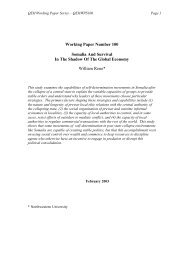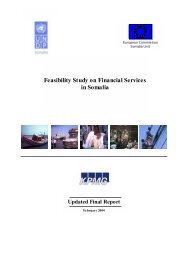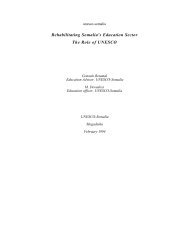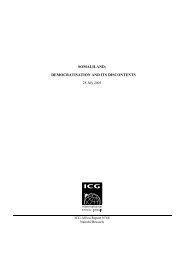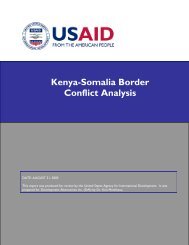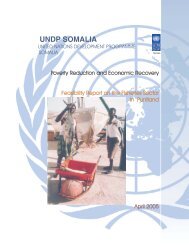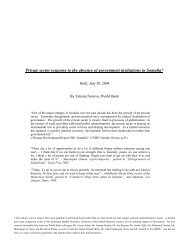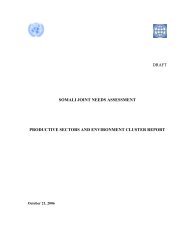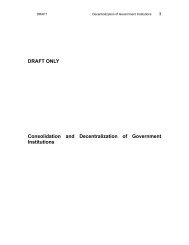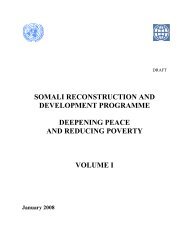Primary Education Survey Evaluation Report Somalia - Somali - JNA
Primary Education Survey Evaluation Report Somalia - Somali - JNA
Primary Education Survey Evaluation Report Somalia - Somali - JNA
You also want an ePaper? Increase the reach of your titles
YUMPU automatically turns print PDFs into web optimized ePapers that Google loves.
PES <strong>Evaluation</strong> <strong>Report</strong>, 2008<br />
EXECUTIVE SUMMARY<br />
1. The <strong>Primary</strong> <strong>Education</strong> <strong>Survey</strong> represents a significant achievement for the education sector of<br />
<strong><strong>Somali</strong>a</strong>. The cooperation between three Ministries of <strong>Education</strong>, UNICEF, DFID and UNESCO<br />
demonstrated in the instigation and continued development of the <strong>Primary</strong> <strong>Education</strong> <strong>Survey</strong><br />
(PES) process, reflects a commitment and dedication to the children of <strong><strong>Somali</strong>a</strong>.<br />
2. The PES reports are well respected within the education sector and the data is widely used in a<br />
range of ways by agencies active in the sector. The MoEs have expressed interest in taking<br />
greater control over the process and in expanding and improving planning processes using<br />
evidence based approaches.<br />
3. The Census approach to the <strong>Survey</strong> should be continued and developed over time into a full<br />
EMIS. The notion of an EMIS that is aspired to is “an organized group of information and<br />
documentation services that collects, stores, processes, analyses and disseminates information for<br />
educational planning and management.” As such it is more than a data storage system. Rather it<br />
integrates system components of inputs, processes, outputs and reporting in such a way that<br />
accuracy, flexibility and adaptability, and efficiency are maximized.<br />
4. Views received from the field indicate that the validity of the data is quite sound, although some<br />
recommendations have been made to improve data collection processes. These are based upon<br />
developing an audit trail so that greater accountability can be achieved.<br />
5. Enumerators and supervisors should be assessed during training and only those demonstrating<br />
competency in the required skills and appropriate ethical values should be employed.<br />
Additionally, an appraisal of field performance should be undertaken following the data<br />
collection and cleaning process.<br />
6. The training for enumerators and supervisors should be expanded to include a number of new<br />
training modules and methodologies. The training should allow the demonstration of competence<br />
and include a greater emphasis on understanding the technical skills being developed.<br />
7. Enumerators and supervisors should be subject to a transparent selection system conducted<br />
jointly by implementing organizations. Rotation of staff supervision arrangements across regions<br />
would improve supervision objectivity.<br />
8. When an effective quality assurance process is in place, responsibility for data collection should<br />
be shifted to REOs and head teachers following adequate training.<br />
9. The timing of the data collection should be shifted to the earliest practical time in the school year.<br />
Late September or early October should be considered. This will allow some data reports being<br />
available to MoE, REOs and school communities during December. This shift will help avoid the<br />
current need for data duplication. As the system develops there will be a need for supplementary<br />
data to be gathered on a term or semester basis.<br />
10. EMIS tools are only marginally useful under current practice. They do not seem to be linked to<br />
the PES data collection process. They should be developed as documentary evidence for the data<br />
being collected and hence contribute to the validity of the system by allowing systematic<br />
checking of summary data. They will also contribute to the supplementary data collection process<br />
when it is developed. More training and supervision of the tools’ use and simplification of tools is<br />
recommended.<br />
11. The plan in 1997 was to develop the PES processes and transfer responsibility for implementation<br />
to the Ministries. Apart from the data collection process this has not been achieved.<br />
6



